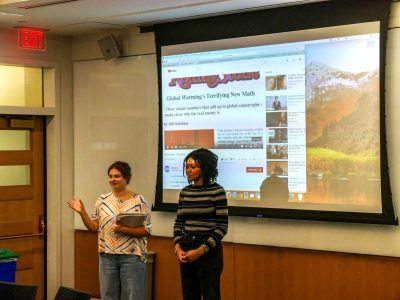
Divest BU hosted a teach-in Sunday at Boston University’s College of Arts and Sciences to emphasize the importance of environmental justice and promote awareness of the world’s excessive carbon emissions.
Divest BU student leader Masha Vernik wrote in an email before the teach-in that the goal of the teach-in was to frame climate change in how it negatively impacts certain groups of people, including women, low-income individuals and people of color. Reinvesting in other organizations can empower these communities, Vernik wrote.
“In demonstrating to attendees the problems posed by environmental injustice and presenting to them our solutions, we hope to engage students in our work and ultimately build student power,” the CAS senior wrote.
Guest speaker Alex Papali, a green justice organizer for the Massachusetts branch of advocacy group Clean Water Action, said during the teach-in throwing plastics in the trash can have hidden consequences on local communities like Chelsea, where many Boston service workers live.
“Get on the Green Line, go to Haymarket, get on the 111 [bus] across the bridge,” Papali said during the teach-in. “You cross that bridge, you’ll see the industrial wasteland that these people live in. It’s right in front of you — this is right next to Boston.”
Papali said that his line of work focuses on serving racially and linguistically diverse low-income communities.
“There’s a lot of people who are stakeholders in our decision-making policies at the State House and City Hall and whatever who are impacted by those policies but don’t have a voice,” Papali said.
Divest BU actively promotes divestment from fossil fuels, according to its website. Divestment is a nationwide movement which calls upon college and university trustee boards to divest their endowments in unclean energy and reinvest the money in “a socially responsible manner.”
The divest movement encompasses 503 institutions across the globe, according to the Divest BU website, leading to the divestment of over $5.44 trillion by hundreds of institutions.
CAS junior Bridget De La Torre said before the teach-in that she would like to see more transparency surrounding BU’s investments, because students themselves give money to the university.
“We are going here to build our future,” De La Torre said in an interview. “But what kind of future are we going to have when the institution is funding things that hurt our future, that aren’t going to let us succeed?”
CAS freshman Matthew Tate said afterward in an interview that he came to the Divest BU event because he felt it calls for environmental justice, which, he said, is lacking in the community.
“I recognize the idea on campus was to reduce carbon emissions, but I never felt there was a strong enough organization to really enforce those regulations,” Tate said, “and so I was really inspired by the passion of the members and really encouraged by all the work that they were doing so far.”


















































































































